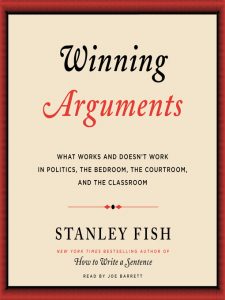Stanley Fish, Winning Arguments: What Works and Doesn’t Work in Politics, the Bedroom, the Courtroom, and the Classroom (New York: Harper Collins, 2016) ISBN: 978-0-06-222665-5
 Stanley Fish, distinguished professor of law in New York and Florida, argues quite simply that “argument is everywhere, argument is unavoidable, argument is interminable, argument is all we have” (3). The world, he says, is rhetorically constructed; we live in a world “bereft of transcendence” (12) and so absolute truth, certainty, and authority are beyond us. We can hope only for persuasion and must argue for it. Nor is there a world without argument or a language so purified of ulterior motives and hidden or overt agendas or rhetorical devices, so objective and factual that it transcends the need for argument (21). Argument arises on account of and in the context of doubt. If doubt may be introduced into the present consensus, argument ensues. In fact, argument can introduce doubt, if only to create its own momentum. Fish cites as examples the serpent in Genesis 3, or the smoking lobby. Thus when and wherever rhetoric is used to inspire doubt in order to progress its own argument, the only adequate response can be rhetorical—a counter-argument. Yet argument is two-faced and double-sided leading either to the Good—via ‘good persuasion,’ a rational sorting of argument based on answering the question, What’s the best thing to be done?, i.e. the good, the right, the best, the fitting—or to the Bad—via ‘bad persuasion,’ which aims at the sympathy of the audience and at leaving the opponent nothing to say. Its question: How do I win? (46). In the end Fish appeals to Aristotle: the best we can do is take care that rhetoric’s potent appeals are deployed solely in the service of truth. ‘Tether the undeniable power of the ethical and pathetic to a rational purpose…make ethos and pathos subordinate to logos and not the other way around; we can have our rhetoric and not be eaten by it too’ (47).
Stanley Fish, distinguished professor of law in New York and Florida, argues quite simply that “argument is everywhere, argument is unavoidable, argument is interminable, argument is all we have” (3). The world, he says, is rhetorically constructed; we live in a world “bereft of transcendence” (12) and so absolute truth, certainty, and authority are beyond us. We can hope only for persuasion and must argue for it. Nor is there a world without argument or a language so purified of ulterior motives and hidden or overt agendas or rhetorical devices, so objective and factual that it transcends the need for argument (21). Argument arises on account of and in the context of doubt. If doubt may be introduced into the present consensus, argument ensues. In fact, argument can introduce doubt, if only to create its own momentum. Fish cites as examples the serpent in Genesis 3, or the smoking lobby. Thus when and wherever rhetoric is used to inspire doubt in order to progress its own argument, the only adequate response can be rhetorical—a counter-argument. Yet argument is two-faced and double-sided leading either to the Good—via ‘good persuasion,’ a rational sorting of argument based on answering the question, What’s the best thing to be done?, i.e. the good, the right, the best, the fitting—or to the Bad—via ‘bad persuasion,’ which aims at the sympathy of the audience and at leaving the opponent nothing to say. Its question: How do I win? (46). In the end Fish appeals to Aristotle: the best we can do is take care that rhetoric’s potent appeals are deployed solely in the service of truth. ‘Tether the undeniable power of the ethical and pathetic to a rational purpose…make ethos and pathos subordinate to logos and not the other way around; we can have our rhetoric and not be eaten by it too’ (47).
This is a synopsis of the first chapter of Winning Arguments. In the final chapter Fish continues his argument that there is nothing but argument: we live not in an abstract world of ‘undistorted or purified communication’ (Habermas, Orwell) where universal harmony is the goal and every word is weighed and cleansed, but in the realm of ‘instrumental purposes’ where every conversation is irremediably situated and local, the entire field of discourse ‘saturated with interest’ (200). This claim is problematic for both religious believers and for ‘liberals’ (those committed to the Enlightenment philosophical program inaugurated by Kant). For Fish, these two groups are both committed to a world without argument, the first by appeal to a higher authority to which all should give assent, the second to what Fish labels a ‘thin proceduralism,’ rules of engagement that bracket off interest-laden norms that produce social and political division (201)—what can and cannot be spoken of or assumed, and the formation of a public language of ‘such generality and metaphysical emptiness that to speak it is to commit oneself to almost nothing’ (202). Whereas religion privileges obedience to a higher authority, liberalism privileges the exercise of choice by the free and autonomous individual. The problem with religion is that not all hold the particular beliefs espoused by the religion; the problem for liberalism is the difficulty of securing a polity in which conflict gives way to harmony when the supreme value is the will of the individual.
And yet, although religion and liberalism are locked in an opposition for which there is no resolution, they are alike in one respect—their claim to be universal, albeit in different ways. Liberal universalism is to be achieved by subtraction, by removing or bracketing comprehensive moral dictates not everyone would recognize; religious universalism is inherent in the comprehensive claim of a religion to be bearing a truth everyone, including nonbelievers, should acknowledge. One kind of universalism says, ‘be an independent, rational chooser rather than someone chosen and scripted by deity or a pregiven morality’; the other says, ‘forgo your independence—you really don’t have it anyway—and allow yourself to be absorbed into a structure not made by hands’ (204-205).

Fish argues that we live in an unredeemed world in which there is no ‘God’s eye view,’ no ‘final meanings of the kind that would stop conflict in its tracks.’ These, simply, are unavailable. In such a world all we have is argument. This is real; it is also ideal: ‘no argument means no assertion, no exploration of alternatives, no movement, no advance in knowledge, no building of community’ (208). This is why the question, Why can’t we all just get along? is illegitimate: ‘a quarrel is evidence of co-existence’ (208).
The wish to escape argument is really the wish to escape language, which is really the wish to escape politics, and is finally the wish to escape mortality—and it won’t matter a whit. For one effect of inhabiting the condition of difference—the condition of being partial, the condition of not being in direct touch with the final unity and full meaning of the universe—is that we long to transcend it; and it is that longing, forever disappointed, that keeps us going (212).
Between the first and last chapters are four chapters dealing with political, domestic, legal, and academic arguments respectively. Each chapter brims with points and illustrations showing how arguments ‘work’ in each of these arena. The most humorous chapter concerns domestic arguments where Fish insists that the only way to ‘win’ in the domestic sphere is if both parties win and so transcend the argument, as it were. This is not to argue for a lack of argument or disagreement, but to show the way in which domestic arguments ‘work.’ The only forward in a domestic argument is to cease from the making of points—establishing whose facts are most correct—and taking up an entirely different mode of interaction altogether, the way of softness, pardon, and forgiveness. Is his point in this chapter at odds with his overall vision and claim? Could such a strategy work in politics or the court room, for example? His answer seems to be No because the context, the participants, and the goals are so different.
Fish writes in a way that is up-to-date, perceptive, at times humorous, and deeply insightful. The purpose of his book is to encourage his readers to engage in argument, passionately, intelligently, aware of the rhetorical and argumentative tactics and strategies at one’s disposal, and using them to advance the quest for that which is good, beneficial and true. He encourages us to become persuasive.
It is likely that many Christians will question his claim that we live in a world bereft of transcendence, that there is no God’s-eye view. Many Christians will rightly point to Jesus Christ as ‘the truth,’ to Scripture as inspired Word of God, and so conclude that Fish is wrong. Such reasoning is too hasty, however. I, too, affirm that Jesus is the Truth with a capital-T, and that Scripture is divinely inspired and authoritative. But our apprehension of this Truth is only ever partial; we see through a glass darkly, and this is the only way in which we can see, this side of eternity.
And so we must argue, intelligently and honestly, and in pursuit of a greater apprehension of the truth. And perhaps more importantly, we must demonstrate the truthfulness of our convictions by living them. The argument of the Christian must always be more than intellectual, more than merely words—though never less! Rather, in a pluralist world the church bears witness to the Truth that lies at the heart of all reality, and does so by the way in which it lives, as Kevin Vanhoozer has so ably stated:
The church’s aim should be to render a faithful interpretation of Scripture.…the reading that gives rise to a way of living that most approximates the life of Jesus himself, the harbinger of the kingdom of God.…The community of believers represents a prophetic counter-culture that challenges the gods and myths of the day with regard to which world and life view best fulfills humanity.…Again, this is not only a matter of correct doctrine but also a matter of faithful biblical performance. The church must be the cultural incarnation of the story of God in Christ (“The World Well Staged? Theology, Culture and Hermeneutics.” In God and Culture, Donald A. Carson and John D. Woodbridge (Eds) (Carlisle: Paternoster, 27-28).